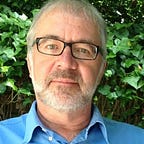Poetry and philosophy: Wallace Stevens
The Idea of WS at Key West
His world was shoreline, trees, a gaudy bird,
the sky, the sun and moon — sufficient to
his purposes: reality imagined
and imagination shadowing
reality. She walked along the beach
and sang her song, the waves broke into foam
or empty sleeves, and he, the onlooker,
was sure that in the song and waves combined
he heard the music of a longed-for time,
the promise of a reconciliation.
He was wrong, of course, and when he turned
toward the town he saw, as darkness fell,
only the tilted lines of glassy lights
reflected in the unforgiving sea.
CD
What is the function of poetry (or ‘verse’ if you prefer)? To communicate, obviously; to share experience in a fuller, richer way than prose allows. According to Don Paterson, poetry is ‘a transmissionary medium’ in which ‘syntax, grammar and logical continuity’ form ‘the carrier wave of plain sense’. Agreed. But perhaps it has another, more important function as a vehicle for philosophical exploration, a means by which the mysteries of being, and of human knowledge of being, can be opened and examined. Poetry can’t explain anything; it isn’t a science. But it can make linguistic space for those thoughts that usually line up behind abstract words like philosophical, metaphysical or epistemological — the biggest and most important thoughts.
It was while studying the poetry of Wallace Stevens that this idea became clear in my mind. I had known and loved certain poems by Stevens for many years — Thirteen Ways to look at a Blackbird, The Emperor of Ice Cream, and The Idea of Order at Key West among them — but I had never been clear about the context of these poems or what Stevens’ intention had been in writing them. Reading around the subject, I came across Helen Vendler’s revealing analysis of The Emperor of Ice Cream. (Apparently it was inspired by a wake, the corpse lying in one room and the party, complete with an ice cream machine and its jovial operator, in the kitchen next door.) Reading more widely in Vendler’s writings I encountered this passage:
‘It is popularly believed that Stevens is a poet preoccupied by the relations between the imagination and reality, and there is good reason for the popular belief, since Stevens so often phrased his own pre-occupation in those unrevealing words. The formula, properly understood, is not untrue; but we must ask what causes the imagination to be so painfully at odds with reality. The cause setting the two at odds is usually, in Stevens’ case, passionate feeling, and not merely epistemological query.’
I found this immediate pushing aside of the philosophical interpretation disappointing, like being handed the key to the poems only to discover that the lock had been changed. While I didn’t doubt the value of Vendler’s basically biographical analysis, I was more interested in the ‘popular belief’, apparently sanctioned by the poet himself.
Stevens often begins a poem with a philosophical prologue. Here are five examples, all taken from the shorter version of An Ordinary Evening in New Haven as published in the Faber Selected Poems:
I
The eye’s plain version is a thing apart,
The vulgate of experience.
II
Reality is the beginning, not the end…
III
We keep coming back and coming back
To the real…
VIII
Professor Eucalyptus said, ‘The search
For reality is as momentous as
The search for god.’
VIII
If it should be true that reality exists
In the mind…
Vendler urges the reader to pass on quickly to the ‘real’ subjects further down the page, but to me these opening statements were inspiring. They seemed to indicate straightforwardly that specific images and ideas in the poem served a larger philosophical purpose. I found a more sympathetic analysis in Simon Critchley’s book: ‘Things Merely Are: Philosophy in the Poetry of Wallace Stevens’. From this I learnt that Stevens’ philosophy was based on his reading of Bertrand Russell, Henri Bergson and William James. Critchley traces further connections with Kant, Heidegger and the phenomenology of Merleau Ponty.
Critchley is happy to confirm that the core concern of Stevens’ poetry is the relationship between imagination and reality. Epistemology, the theory of knowledge, is the appropriate philosophical term. Stevens is neither a Realist nor an Idealist. He does not deny the real existence of the world around him, but neither does he imagine that he can ever gain any certain knowledge of it. Certain knowledge may be a logical impossibility, but there is another kind of knowledge, poetic knowledge, that is embodied and human rather than abstract or scientific. For Stevens, poetry is a way of knowing the world, not just a way of talking about it. It is a kind of philosophy in its own right.
An obvious way to explore Stevens’ world was to write versions of his poems. I chose The Idea of Order at Key West (‘The Idea of WS at Key West’, see above) and part XXVIII of the longer version of An Ordinary Evening in New Haven (‘An Ordinary Morning’).
An ordinary morning
Real and unreal are two in one, says Stevens.
The loaf of bread is real. The tin plate
and long-bladed knife are real.
Knowing nothing of one another
they will rest here on the table,
in the turning light for ever.
You object, of course: they will decay
eventually, like all the worlds
that ever were. Such innocent credulity!
For if they are real they are also unreal,
though they rest here on the table.
Their forecast fate, or false eternity,
are conjured in an instant and forgotten.
CD
My versions suffer from the weakness common to all imitations and revivals: that they necessarily fail to capture the most important quality of the originals — their originality. Whether my experimental versions pay homage to Stevens or insult his legacy is an open question.
